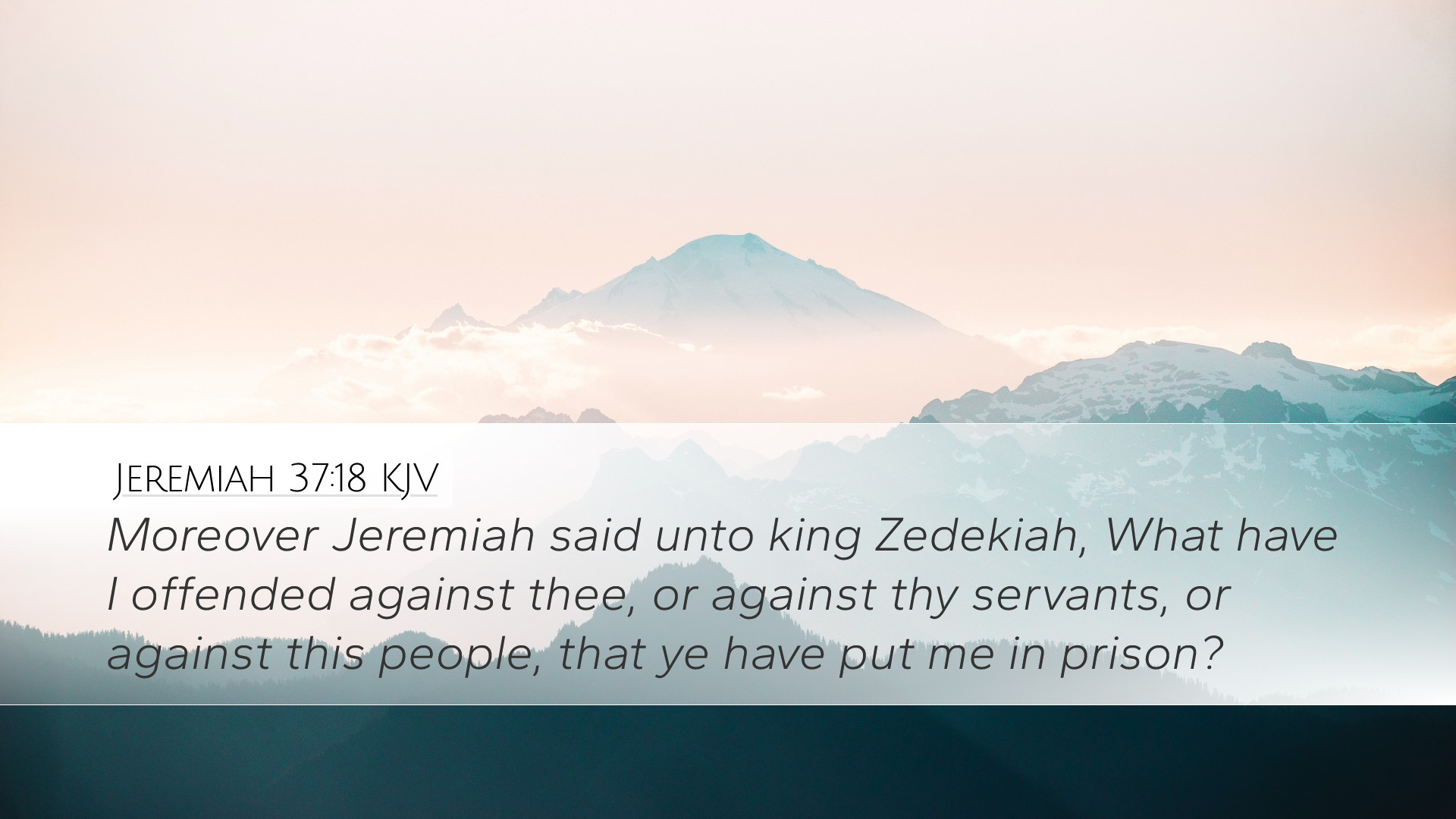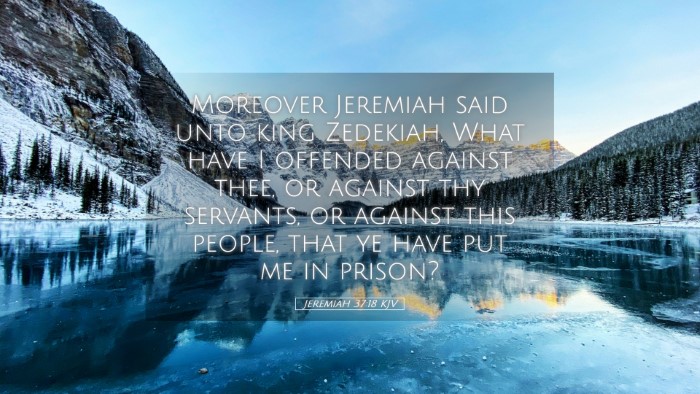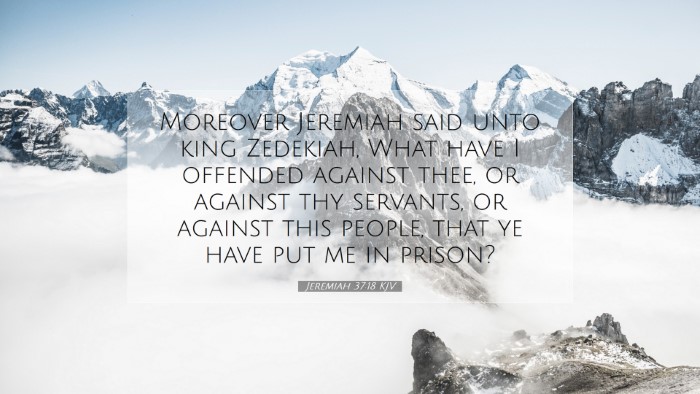Commentary on Jeremiah 37:18
Verse: "Moreover, Jeremiah said unto King Zedekiah, What have I offended against thee, or against thy servants, or against this people, that ye have put me in prison?" (Jeremiah 37:18, KJV)
Introduction
This verse outlines a critical moment in the life of the prophet Jeremiah as he confronts King Zedekiah about the injustice of his imprisonment. Jeremiah's appeal is not only to the king personally but encompasses the broader context of the people of Judah, emphasizing the weight of prophetic ministry amid political turbulence.
Historical Context
To fully appreciate this passage, one must consider the historical backdrop. Jeremiah prophesied during the final days of the Kingdom of Judah, a period marked by moral decay, idolatry, and impending doom due to Babylonian threats. Zedekiah, the last king of Judah, found himself caught between his loyalty to Egypt and the growing power of Babylon. Jeremiah's prophetic messages often criticized the national leaders and called for repentance, which undoubtedly angered the king and led to his imprisonment.
Commentary Insights
1. The Prophet's Innocence
Matthew Henry's commentary emphasizes Jeremiah's innocence in the matter, arguing that he had not acted against either the king or the people. Rather, he had been a loyal servant whose sole aim was to deliver God's messages, which unfortunately were unpopular in a time of national crisis.
2. The Nature of the Offense
Albert Barnes notes the rhetorical question posed by Jeremiah highlights the nature of his offense — there was none. His imprisonment represents a profound miscarriage of justice, and Barnes elaborates on how Jeremiah’s role as a prophet compelled him to speak truth to power, inevitably leading to personal suffering.
3. A Plea for Justice
Adam Clarke provides a poignant view of Jeremiah’s plea. It serves not only as an appeal for his own release but as a broader indictment against the leadership of Judah, illustrating the consequences of ignoring divine counsel. By questioning Zedekiah, Jeremiah is calling into account the moral responsibility of the king and his officials.
4. The Role of Prophecy
This verse encapsulates the struggle of the prophetic office, as noted by Henry, who states that prophets often endure trials due to their truth-telling. Here, Jeremiah exemplifies the characteristics of a faithful prophet — persistence, honesty, and an unwavering commitment to God’s message even when facing dire consequences.
Theological Reflections
In analyzing this verse, it is evident that prophetic ministry can be fraught with conflict, especially when it challenges the status quo. Here, Jeremiah's direct confrontation serves as a timeless reminder to contemporary Christians regarding the call to speak for justice and truth, irrespective of personal cost.
5. Leadership Accountability
Barnes points out that Jeremiah's question is not merely defensive; it serves as a means of holding the king accountable for the treatment of those who speak on behalf of God. This emphasizes an essential principle: leaders in any capacity are subject to scrutiny and must align their actions with divine justice and righteousness.
6. Emotions in Prophetic Ministry
Clarke discusses the emotional weight of Jeremiah’s words, underscoring the prophet's sense of betrayal and injustice. Such an emotional expression is crucial in understanding the prophetic mission as one deeply intertwined with human experience and suffering, reflecting God's concern for both the prophet and the people.
Application for Today
This passage remains relevant for pastors, students, and scholars of the Bible today. It highlights the ongoing theme of speaking truth to power, the challenges faced within a ministry, and the necessity for leaders to engage with integrity and justice. As faithful followers of Christ, believers are encouraged to emulate Jeremiah's courage, advocating for righteousness in all spheres of life.
7. Encouragement for the Faithful
Henry concludes that amidst opposition, the faithful must hold onto the promises of God and trust in His ultimate justice. Each believer is reminded that they have a role in God's narrative, where even in suffering, obedience is essential.
8. Reflecting on Injustice
This verse calls for reflection on how injustice is dealt with in contemporary society. Jeremiah serves as a prophetic voice not only for his time but for those who fight against corruption and abuse of power today, reminding us that God's prophets are often marginalized yet crucial for societal health.
Conclusion
Ultimately, Jeremiah 37:18 challenges us to consider the role of the prophets in our lives and societies—those who may be silenced or imprisoned for their commitment to truth. The ongoing relevance of Jeremiah’s questions reminds contemporary believers of the need for courage, integrity, and steadfastness in proclaiming God’s truth, especially in the face of hostility and misunderstanding.
May this insight inspire continued commitment to uphold divine justice and truth, much like Jeremiah, within our own contexts.


